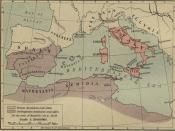One of the most powerful empires throughout the course of history was that of the Romans. The nearly five centuries, from 510-44 BC, marked the period known as the Roman Republic. During this time, Rome progressed from an insignificant state into a powerful authority. The dramatic rise of the Roman Republic and its ultimate evolution into the Roman Empire are historically important because of the many cultural developments and transformations that occurred during this period. As Rome emerged from a Republic to an Empire, the original, underlining virtues and qualities upon which Rome was built were altered and ultimately replaced.
After defeating the Etruscans in 509 BC, Rome's political institution underwent many developments. The Romans, who had been previously ruled by a monarchy, replaced the king with two magistrates, called consuls, with imperial authority (Oliphant 125). This resulted in "a new aristocracy composed of patrician and wealthy plebeian families" (Rome, Encarta).
The republic government became "the collective rule of an aristocracy, dependent in theory-and to a varying degree in practice-on the will of a popular assembly" (Oliphant 125). Despite the establishment of this new republic, the treatment of the common plebeians was no better than before and the "marked contrast between the conditions of the rich and the poor led to struggles in the later Republic" (Rome, Encarta).
During the early republic years, Rome was largely an agricultural and primitive nation. There were a number of qualities that embodied the Roman way of life and were critical to its evolution. The people of Rome were serious, dedicated workers (Rempel). Their culture was a simple one where moral values of honesty and courage were highly regarded. The Roman people were loyal, obedient, and extremely devoted to their family, religion and government (Rempel). Also, the attribute of a strong military force was...



Bad essay
this essay is awful,, delete it now
2 out of 5 people found this comment useful.